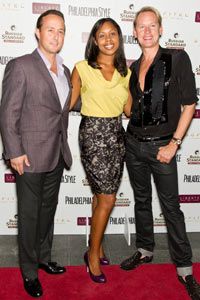Big, bold and beautiful color-blocking is high fashion's answer to a Mark Rothko painting. The abstract expressionist's signature "multiform" paintings celebrated contrasting and complementary colors. In fashion, designers are using bright hues taken from the opposite sides of the color wheel to create stunning ensembles. Want proof? Just peek at almost any women's magazine cover, and you're likely to see a current example of the color-blocking trend.
But even in the anything-goes world of fashion, where yesterday's must-have, cutting-edge runway styles are dismissed just a few months later, there are some basic rules to help you get the most out of color blocking. The first is to understand the color wheel and how colors match (or, perhaps more importantly, don't match).
Advertisement
Think of the primary colors -- blue, red, and yellow -- as three points of the clock face stationed at 12, 4 and 8 (like the three points of the Mercedes-Benz logo). Halfway between red and yellow will be orange, halfway between yellow and blue will be green, and halfway between blue and red will be purple. From there, you can fill in all the shades of the rainbow.
The next step, says The Accessorizer blogger Krisztina Williams, is to decide if you're going to select a color-block ensemble with complementary colors (choosing shades from opposite sides of the wheel), monochromatic colors (the same color in different shades), neutral colors (white, black, grays, and browns) or analogous colors (shades that neighbor each other on the color wheel). You can even pair a dazzling color (hot pink!) with a neutral shade or use a fluorescent or neon shade to perk up understated tones.
As you can see, the possibilities are almost endless, allowing you to color block your wardrobe regardless of the season, and can be done by matching separates with a skirt or pants (or shorts), or with preprinted dresses (just be sure to match your skin tone). How you layer your color blocks, though, definitely matters. Most blocks are done horizontally, which doesn't have a slimming effect. Obviously, that optical reality favors more petite or well-proportioned people and is something to keep in mind if you're conscientious about your size. Another option is to use prints that color block vertically.
According to the style mavens at Real Simple magazine, the fundamentals of figure flattery still apply. To wit, brights attract, while darks conceal. For example, they suggest a vibrant jacket and flats will ensure that no one focuses on your hips and thighs. They also suggest that three is indeed the magic number, encouraging a trio of shades to bring everything together. However, resist the temptation to go with more than four blocks. Five, say Real Simple editors, "is bordering on clown costume." If you opt for similar shades, go with the same color "intensity," pairing brights with brights, and the like.
Accessories, particularly a big belt, chunky jewelry and eye-catching shoes are an ideal way to take color blocking to another level. Bright, patterned prints, like scarves and belts, can also spruce up a color-block ensemble, provided you let the colors in the print dictate which colors you put together. Most importantly, have fun, and experiment to see what works best for you.
Advertisement

